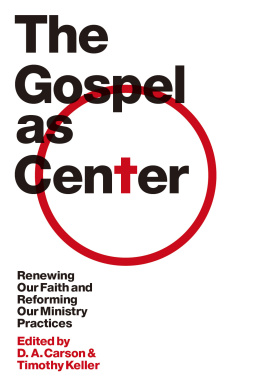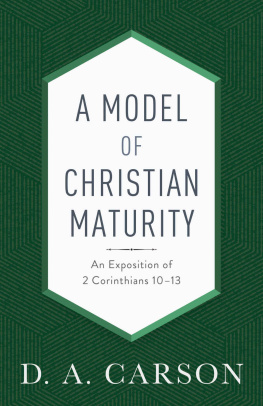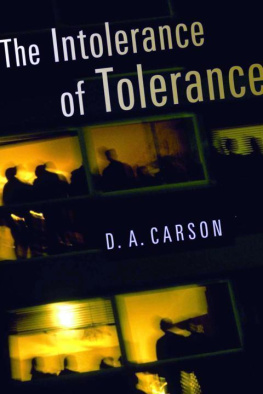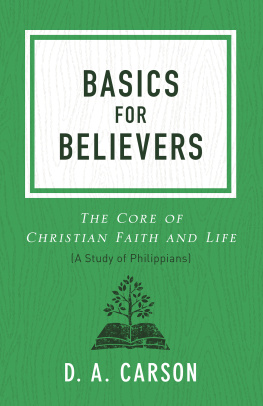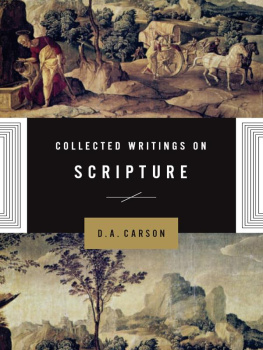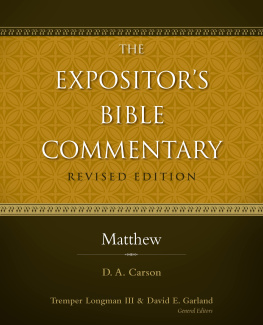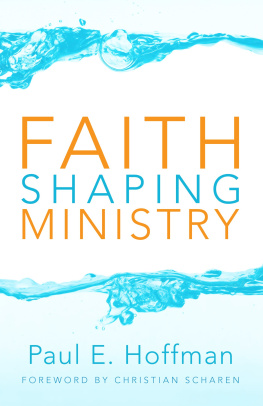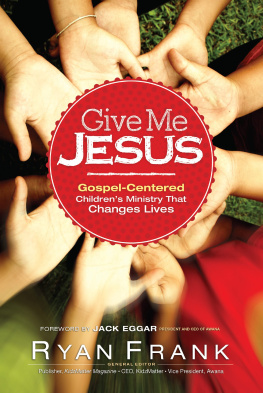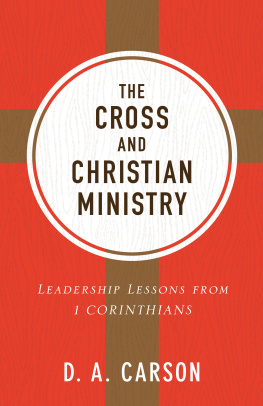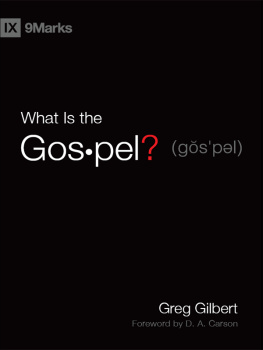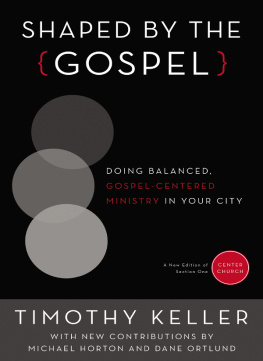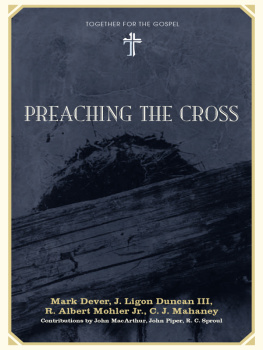D. A. Carson - The Gospel as Center: Renewing Our Faith and Reforming Our Ministry Practices
Here you can read online D. A. Carson - The Gospel as Center: Renewing Our Faith and Reforming Our Ministry Practices full text of the book (entire story) in english for free. Download pdf and epub, get meaning, cover and reviews about this ebook. year: 2012, publisher: Crossway, genre: Religion. Description of the work, (preface) as well as reviews are available. Best literature library LitArk.com created for fans of good reading and offers a wide selection of genres:
Romance novel
Science fiction
Adventure
Detective
Science
History
Home and family
Prose
Art
Politics
Computer
Non-fiction
Religion
Business
Children
Humor
Choose a favorite category and find really read worthwhile books. Enjoy immersion in the world of imagination, feel the emotions of the characters or learn something new for yourself, make an fascinating discovery.
- Book:The Gospel as Center: Renewing Our Faith and Reforming Our Ministry Practices
- Author:
- Publisher:Crossway
- Genre:
- Year:2012
- Rating:3 / 5
- Favourites:Add to favourites
- Your mark:
- 60
- 1
- 2
- 3
- 4
- 5
The Gospel as Center: Renewing Our Faith and Reforming Our Ministry Practices: summary, description and annotation
We offer to read an annotation, description, summary or preface (depends on what the author of the book "The Gospel as Center: Renewing Our Faith and Reforming Our Ministry Practices" wrote himself). If you haven't found the necessary information about the book — write in the comments, we will try to find it.
The Gospel as Center: Renewing Our Faith and Reforming Our Ministry Practices — read online for free the complete book (whole text) full work
Below is the text of the book, divided by pages. System saving the place of the last page read, allows you to conveniently read the book "The Gospel as Center: Renewing Our Faith and Reforming Our Ministry Practices" online for free, without having to search again every time where you left off. Put a bookmark, and you can go to the page where you finished reading at any time.
Font size:
Interval:
Bookmark:


The Gospel as Center: Renewing Our Faith and Reforming Our Ministry Practices
Copyright 2012 by The Gospel Coalition
Published by Crossway
1300 Crescent Street
Wheaton, Illinois 60187
All rights reserved. No part of this publication may be reproduced, stored in aretrieval system, or transmitted in any form by any means, electronic, mechanical,photocopy, recording, or otherwise, without the prior permission of the publisher,except as provided for by USA copyright law.
Cover design: Matthew Wahl
First printing 2012
Printed in the United States of America
Unless otherwise indicated, Scripture quotations are from the ESV Bible ( The Holy Bible, English Standard Version ), copyright 2001 by Crossway. Used by permission. All rights reserved.
Scripture quotations marked KJV are from the King James Version of the Bible.
Scripture quotations marked NASB are from The New American Standard Bible. Copyright The Lockman Foundation 1960, 1962, 1963, 1968, 1971, 1972, 1973, 1975, 1977. Used by permission.
Scripture quotations marked NIV are from The Holy Bible, New International Version, NIV. Copyright 1973, 1978, 1984, 2011 by Biblica, Inc. Used by permission. All rights reserved worldwide.
Scripture quotations marked RSV are from The Revised Standard Version. Copyright 1946, 1952, 1971, 1973 by the Division of Christian Education of the National Council of the Churches of Christ in the U.S.A.
All emphases in Scripture quotations have been added by the authors.
Hardcover ISBN: 978-1-4335-1561-3
PDF ISBN: 978-1-4335-1562-0
Mobipocket ISBN: 978-1-4335-1563-7
EPub ISBN: 978-1-4335-1867-6
Library of Congress Cataloging-in-Publication Data
The Gospel as center : renewing our faith and reforming our ministry practices / D. A. Carson and Timothy Keller, editors.
p. cm.
Includes bibliographical references and indexes.
ISBN 978-1-4335-1561-3 (hc)
1. Gospel Coalition. I. Carson, D. A. II. Keller, Timothy J., 1950III. Gospel Coalition.
BX6.G67G67 2012
230'.04624dc23 2011026425
Crossway is a publishing ministry of Good News Publishers.
LB 21 20 19 18 17 16 15 14 13 12
15 14 13 12 11 10 9 8 7 6 5 4 3 2 1
D. A. Carson and Timothy Keller |
Richard D. Phillips |
Mike Bullmore |
Andrew M. Davis |
Reddit Andrews III |
Colin S. Smith |
Bryan Chapell |
Sandy Willson |
Philip Graham Ryken |
Kevin DeYoung |
Stephen Um |
Tim Savage |
Thabiti Anyabwile and J. Ligon Duncan |
Sam Storms |
D. A. Carson and Timothy Keller
The Gospel Coalition is a fellowship of churches and Christians from many different denominations that are united not only by belief in the biblical gospel but also by the conviction that gospel-centered ministry today must be strengthened, encouraged, and advanced. What follows gives a bit of the history of how and why we have come together.
Several years ago a number of us began to meet together annually. That group became The Gospel Coalitions Council. For the first three years we sought to do two things.
First, we sought to identify and strengthen the center of confessional evangelicalism. We believe that some important aspects of the historic understanding of the biblical gospel are in danger of being muddied or lost in our churches today. These include the necessity of the new birth, justification by faith alone, and atonement through propitiation and the substitutionary death of Christ. We sought to maintain and strengthen our hold on these doctrines, not merely by citing the great theological formulations of the past but also through continued, fresh interaction with the Scripture itself, and so we worked together to produce The Gospel Coalitions Confessional Statement.
Many members told me afterward that working on the Confessional Statement was one of the most edifying and instructional experiences they had ever had. About four dozen experienced pastors worked it over line by line. One of our goals was to draw our language as much from the Bible as possible rather than to resort too quickly to the vocabulary of systematic theology. Systematics is crucial, and terms such as the Trinity , which are not found in the Bible itself, are irreplaceable for understanding and expressing large swaths of the Bibles teaching. Nevertheless, to maintain unity among ourselves and to persuade our readers, we sought to express our faith as much as possible in biblical-theological categories rather than drawing on the terminology of any particular traditions systematic theology.
We also thought it was important to begin our confession with God rather than with Scripture. This is significant. The Enlightenment was overconfident about human rationality. Some strands of it assumed it was possible to build systems of thought on unassailable foundations that could be absolutely certain to unaided human reason. Despite their frequent vilification of the Enlightenment, many conservative evangelicals have nevertheless been shaped by it. This can be seen in how many evangelical statements of faith start with the Scripture, not with God. They proceed from Scripture to doctrine through rigorous exegesis in order to build (what they consider) an absolutely sure, guaranteed-true-to-Scripture theology.
The problem is that this is essentially a foundationalist approach to knowledge. It ignores the degree to which our cultural location affects our interpretation of the Bible, and it assumes a very rigid subject-object distinction. It ignores historical theology, philosophy, and cultural reflection. Starting with the Scripture leads readers to the overconfidence that their exegesis of biblical texts has produced a system of perfect doctrinal truth. This can create pride and rigidity because it may not sufficiently acknowledge the fallenness of human reason.
We believe it is best to start with God, to declare (with John Calvin, Institutes 1.1) that without knowledge of God we cannot know ourselves, our world, or anything else. If there is no God, we would have no reason to trust our reason.
Also, as part of this process, we gave some time to the question, Is the term evangelical useful anymore? A good case can be made for the position that it is not. Within the church, the word conveys less and less theological content. The word almost means all who are willing to use the term born again to describe their experiences. Outside the church, the word has perhaps the most negative connotations it has ever had.
Nevertheless, the term describes our churches and association. Why? We come from different denominations and traditionsBaptist, Presbyterian, Episcopalian, and charismatic, to name the larger groupings. We do not think the distinctives of theology and ecclesiology that divide us are insignificantnot at all. They shape our ministries and differentiate us in many important ways. (One could say complementary ways, but that would be another essay.) However, we are united by the conviction that what unites usthe doctrinal core components of the gospelis far more important than what divides us. On the one hand, that conviction differentiates us from those who believe that there is no gospel to preach apart from the distinctions of their tradition. They do not think that their denominational distinctives are secondary. On the other hand, that conviction differentiates us from those who would rather define evangelicalism only in sociological or experiential terms and who would therefore not make such a robust doctrinal confessional statement the basis for fellowship and cooperation.
Font size:
Interval:
Bookmark:
Similar books «The Gospel as Center: Renewing Our Faith and Reforming Our Ministry Practices»
Look at similar books to The Gospel as Center: Renewing Our Faith and Reforming Our Ministry Practices. We have selected literature similar in name and meaning in the hope of providing readers with more options to find new, interesting, not yet read works.
Discussion, reviews of the book The Gospel as Center: Renewing Our Faith and Reforming Our Ministry Practices and just readers' own opinions. Leave your comments, write what you think about the work, its meaning or the main characters. Specify what exactly you liked and what you didn't like, and why you think so.

